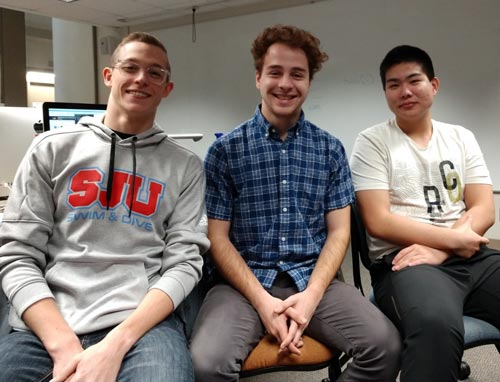Two teams from CSB/SJU compete in international programming contest
December 5, 2018

Team Johnnies – made up of (from left) Jacob Upton, Matt Zent and Zhaochen Bai – finished second at their contest site and 24th in the regional competition in the ACM International Collegiate Programming Contest.
Six students from the College of Saint Benedict and Saint John’s University just added an impressive line to their résumés.
The students competed in the ACM International Collegiate Programming Contest (ICPC) Nov. 3 at Macalester College in St. Paul, Minnesota.
Macalester was one of 15 sites in the North Central North American Region that hosted one-day competitions. The region consists of 209 schools from Minnesota, Wisconsin, Iowa, North Dakota, South Dakota, Michigan, Nebraska and Kansas, as well as the Canadian provinces of Ontario and Manitoba.
Seventeen teams competed at Macalester, representing CSB/SJU, Carleton, St. Cloud State, Wisconsin-River Falls, Wisconsin-Eau Claire and the host Scots.
Team Johnnies – made up of Jacob Upton (senior, computer science and mathematics double-major, Bloomington, Minnesota), Matt Zent (senior, computer science major, West Fargo, North Dakota) and Zhaochen Bai (junior, computer science major, Beijing) – finished second at Macalester and 24th in the region.
Team ByteMe 2.0 – Michael Carroll (junior, computer science major, St. Paul), Ryan Strelow (junior, computer science major, Osakis, Minnesota) and Nick Tawil (junior, computer science major, Minneapolis) - placed 12th at Macalester and 109th in the region.
“There’s a lot of prestige involved in this contest, because pretty much all the big schools compete in it,” said Imad Rahal, professor of computer science at CSB and SJU and coach of the teams. “Big companies look at that with a lot of respect. Some say, ‘Oh, the ACM Programming Contest, that’s great, that’s a big deal.’ “
Rahal especially noted the finish of Team Johnnies.
“Finishing 24th in the region is pretty darn impressive,” he said. “You’re talking about competing with the big technical schools like the University of Minnesota and the University of Wisconsin. You’re talking about big, big schools there, and to be in the top 10 percent (actually 11.4 percent) as a liberal arts college … that’s huge.”
Started in 1970, the ICPC is an algorithmic programming contest for college students. Teams of three, representing their university, work to solve the most real-world problems with a grueling five-hour deadline, fostering collaboration, creativity, innovation and the ability to perform under pressure. Collaborating around a shared computer with a problem statement, teams race against the clock in an intense exercise of reasoning, strategy and persistence.
The team or teams that solve the greatest number of problems in the fewest attempts in the least cumulative time are declared the regional winners and will have the exceptional opportunity to advance to the ICPC World Finals.
Internationally, more than 50,000 students from more than 3,000 colleges and universities from 111 countries competed at various regional sites.
CSB and SJU have sent a team or teams to the competition for a number of years, Rahal said. The students are selected through a lab course called Programming Contest. This semester, 10 students meet once a week for three hours and solve sample problems from previous competitions.
“We basically do training starting from week one (of the semester) to prepare our students for the event,” Rahal said.
From there, Rahal chose his top six students to compete at Macalester.
“This is something we’ve been investing in, because students really like it,” Rahal said of the competition. “It gives them a very nice, realistic experiential type of learning. They’re competing, they’re showing their skills and their talents. But it’s not just technical skills, it’s their time management skills, especially under pressure.”
